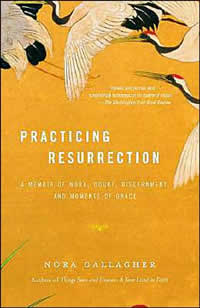Book Notes
 Nora Gallagher, Practicing Resurrection; A Memoir of Work, Doubt, Discernment, and Moments of Grace (New York: Vintage, 2003), 216pp.
Nora Gallagher, Practicing Resurrection; A Memoir of Work, Doubt, Discernment, and Moments of Grace (New York: Vintage, 2003), 216pp.
In this sequel to her bestseller Things Seen and Unseen (1998), Nora Gallagher continues to explore what a life of Christian faith marked by authenticity and integrity might look like in our contemporary world. She compares her journey of faith to the swimming lessons she took as a child: "The life of faith [is] amorphous, ephemeral, a glimpse, a moment. Trusting it [is] like my early swimming lessons learning to float." In particular, her brother Kit's diagnosis of bladder cancer, a prognosis for a "zero percent" chance of recovery, the horrors of surgery and chemotherapy, and eventual death all forced her to ask life-altering questions about God's call upon her own life.
The themes of vocation and call loom large in Practicing Resurrection. Through her many involvements at Trinity Episcopal Church in Santa Barbara, Gallagher began to wonder what might God have for her. To what could she devote her passion and considerable skills? Where did her joy and gladness intersect with the world's needs, as Buechner once put it? Sensing a possible call to the priesthood, her church formed a "discernment committee" of four saints. They met once a month for three hours across the year, plying Gallagher with questions, telling their own stories about vocation, reading the Scriptures, praying, and, perhaps most important of all, "honoring listening." What voices should she listen to? Which ones should she tune out? What about her husband's deep ambivalence? Was the priesthood any more sacred than her identity as a writer that she had nurtured for over thirty years? After negotiating the labyrinth of the Episcopal bureaucracy and its application process, Gallagher was "exiled" to a very different parish with a very different priest for a year as a ministry-study student. At first she felt like she and the priest were on a "bad blind date," but across the year she gained a deep appreciation for her mentor's faithfulness.
While Gallagher was trying to discern how she might hear God's call, Trinity Episcopal grappled with how as a church they might extend a call. Their interim pastor had informed the vestry that he was gay. Should that impact whether they called him as their regular priest? How did they guard issues of confidentiality once the vestry knew but the congregation did not? How to tell the congregation? What about feelings of distrust and betrayal? Should the church wrap the different but related matter of gay marriages in with the possible call of the pastor? How might the denominational officials respond, if at all?
You'll have to read this fine memoir to learn about Gallagher's call to church and the church's call to their pastor. In the end she likens herself to a friend who was listening to an unctuous priest ask, "what do you really want for Christmas this year?" Her friend responded, "What I wanted to do was to stand up and call out, 'I would like to really believe in the resurrection.'" Her remark reminded me of the words of the eminent church historian Jaroslav Pelikan, who near the end of his life said, "If Jesus rose from the dead, nothing else matters. If Jesus did not raise from the dead, nothing else matters." In practicing resurrection we thus inaugurate a tiny bit of God's eschatological future into our lives today.
Gallagher's fans, and their numbers are considerable, will want to note the release of her first novel, Changing Light, in early 2007.


